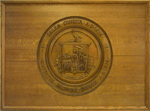Savage, Sarah: Difference between revisions
No edit summary |
No edit summary |
||
| Line 1: | Line 1: | ||
'''Sarah Savage''' (1784-1838) | '''Sarah Savage''' (1784-1838) a writer and teacher was born in Salem to Ezekial Savage and Margaret (Vose) Savage. Sarah’s formal education is not known. Her religious education mirrored the changing times. She used her education and religious training as a teacher and as a writer. She kept a select private school in Salem for many years. She also taught a Sabbath School at the Tabernacle Church. | ||
Her first book, the Factory Girl was published in 1814. It was one of the first “factory novels” in America. Many of her works would focus on morality in Industrial America. | Her first book, the Factory Girl was published in 1814. It was one of the first “factory novels” in America. Many of her works would focus on morality in Industrial America. | ||
Revision as of 11:46, 13 April 2017
Sarah Savage (1784-1838) a writer and teacher was born in Salem to Ezekial Savage and Margaret (Vose) Savage. Sarah’s formal education is not known. Her religious education mirrored the changing times. She used her education and religious training as a teacher and as a writer. She kept a select private school in Salem for many years. She also taught a Sabbath School at the Tabernacle Church.
Her first book, the Factory Girl was published in 1814. It was one of the first “factory novels” in America. Many of her works would focus on morality in Industrial America.
Savage published at least twelve books anonymously between The Factory Girl in 1814 and her death in 1837: Filial Affection; or, The Clergyman’s Granddaughter (1820), James Talbot (1821), Advice to a Young Woman at Service (1823), The Suspected Boy (1824), The Badge (1824), The Two Birth-Days (1826), Life of Phillip, the Indian Chief (1827), Sunday School Conversations (1829, following a trend in writing narrative conversations), Blind Mariam Restored to Sight (1833), and her last, Trial and Self-Discipline (1835). Her works were all primarily focused on moral issues and religion, and aimed at children and young adults because of her history as a teacher. Most of these books were printed by Unitarian publishers.
She weaves moral themes through much of her writing. They were geared to children. She writes about maintaining one's integrity in the factories, when surrounded by others who did not share your moral code, and how to behave in a Christian manner if working as a domestic.
See Also
Essex Institute Historical Collections Vol. 127 (July 1991), p. 240-257
